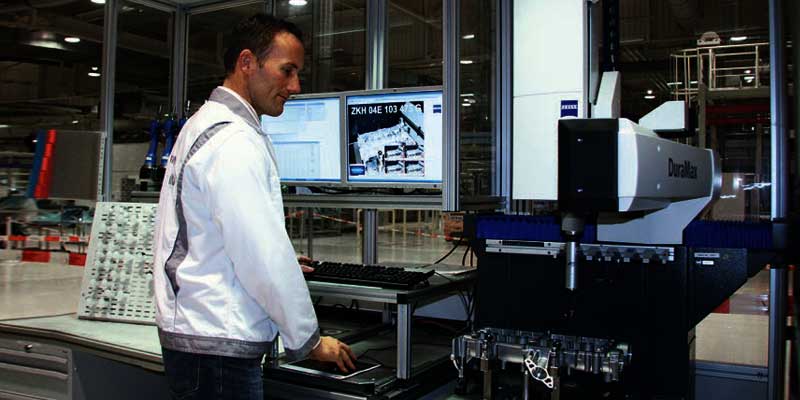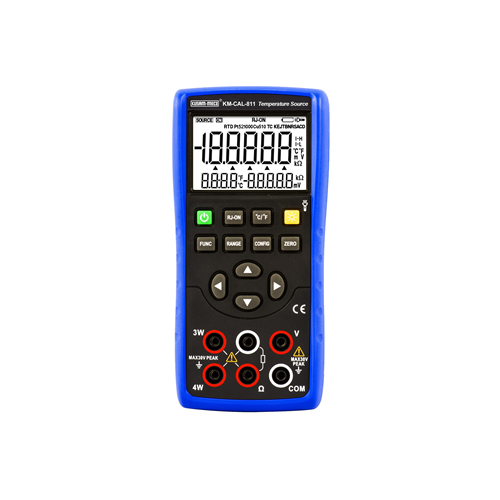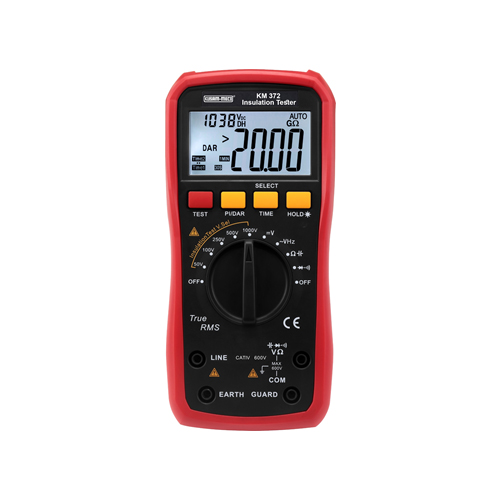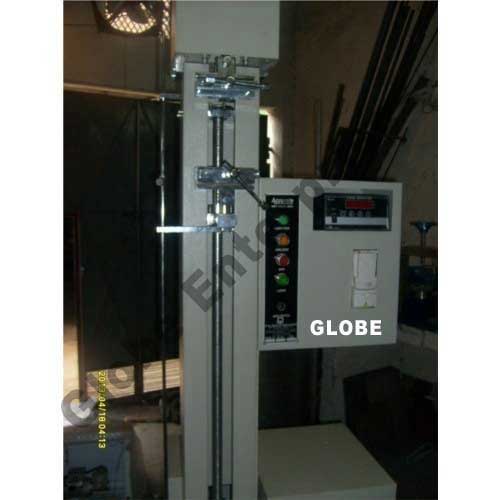Schedule a Call Back
Everything is adaptable, even machines
 Industry News
Industry News- Jun 29,22

Monitoring equipment, templates, slide gauges and dial gauges – at the engine factory of Volkswagen Sachsen GmbH in Chemnitz, Germany, these tools for elaborate manual measurements are a thing of the past. They can be flexibly adapted to new products and generations.
“A measuring machine like DuraMax fully meets our demands,” says Matthias Kurth who is responsible for tool and measuring technology planning at the Chemnitz engine factory of Volkswagen Sachsen GmbH. Until now, there weren’t any coordinate measuring machines small and robust enough to complete the measuring jobs directly next to the machines. The operators had to inspect the sizes and forms of the parts with traditional inspection equipment and other manual gauges. The problem: the measuring tools were rigid and inflexible. With each new generation of products and versions, these tools had to be adapted in a timeconsuming process or replaced. “We live in a dynamic world,” emphasizes Kurth. “Due to market developments, new laws and product innovations, we often had to change our engine production every three years.” It has long been possible to flexibly retool the production facilities of Volkswagen for new engine technologies necessitated by the environmental demands increasing at ever shorter intervals. This gradually required a new approach to measuring concepts.
In-process quality inspection
Process and product quality are among the most important goals of the Volkswagen Group. This, of course, requires corresponding quality inspection concepts. To ensure that each engine part – from the cylinder head to the crankshaft – meets the demands on quality, the Chemnitz factory relies on a three-tiered measuring concept: “Using the corresponding process measuring technology, the machines automatically inspect a limited number of features that are particularly important to the product and also have high dimensional requirements,” explains Kurth. Quality criteria with very high demands on the precision of the form, position and surface are controlled by measuring technicians using measuring machines in the measuring lab no more than once a day. Furthermore, there are a number of features particularly relevant to the process that have to be measured very precisely several times a day. System operators therefore check these dimensions in-process on measuring stations directly on the shop floor. Every four to six hours they take samples and check if the specifications have been complied with.
Just one flexible system Today, these random measurements are completed on the shop floor directly next to the machines by the flexibly programmable DuraMax 3D coordinate measuring machine from Carl Zeiss. This enables Volkswagen Sachsen to support the production of all key engine parts. The main benefit: instead of multiple inspection tools, all that is required is a single measuring machine that can be adapted to a new part or to the measuring jobs of a new generation of engines in just a few steps.
DuraMax replaces, for example, one measuring station with six different measuring tools, two measuring computers and two gauges for the inspection of boreholes. This enables the Chemnitz engine factory to considerably reduce their investment costs. The follow-up costs for maintenance and calibration are also much lower now.
Furthermore, the measuring results are more detailed and reliable, and can be quickly evaluated on a computer. Is the bearing channel manufactured in a way that the crankshaft fits in the cylinder crank case afterwards? Do the axial positions of the parts match? Do the dimensions comply with the specifications so that the bearing cap can be screwed on? DuraMax quickly and reliably answers all these questions. While the machine is working, employees can do other jobs. They subsequently draw their conclusions from the measuring log and the short-term statistics: do the values exceed tolerance; does production have to be stopped and optimized? Or is everything running as scheduled and can the workpiece be returned to the process?
On site DuraMax measures all relevant features in three to 15 minutes. It would take employees at least as long, and would prevent them from doing anything else during this time. They would use many different tools and only deliver a fraction of the measured values and often with less accuracy.
The coordinate measuring machine also saves time when special measurements are required. Changing tools and long machine downtimes often require additional data that monitoring equipment could not provide in the past. Employees had to take their workpiece to the measuring lab. Until a part was measured, the machine stood idle. With a coordinate measuring machine on the shop floor, a trip to the measuring lab is no longer required in such cases. Moreover, the measuring results are comparable to those in the measuring lab regarding scope, precision and evaluability – a welcome side effect at Volkswagen Saxony.
The Chemnitz engine factory has relied on coordinate measuring technology from Carl Zeiss IMT for its measuring labs since 1987. However, it was only the launch of the small and robust DuraMax that made it possible to take this technology directly to the measuring stations on the shop floor. The machine’s footprint of around one square meter, including a computer, corresponds to that of a conventional measuring table. Because the need for space and investments is limited, the engine factory sometimes uses several machines within a single production line – each following different processing steps.
Of course, measuring ranges and stylus configurations are limited compared to the larger coordinate measuring machines. On the other hand, compared to other measuring machines DuraMax works at temperatures between 18 and 35 degrees Celsius, is insensitive to dirt and does not require compressed air, simply a power plug.
With measuring concepts towards the production process
Volkswagen Saxony has long desired a flexible replacement for the monitoring tools at the measuring stations on the production lines. When Carl Zeiss IMT introduced DuraMax at the 2008 Control Show everything moved extremely quickly. DuraMax fit the overall concept: the engine factory already had three other coordinate measuring machines from Carl Zeiss IMT and generated the measurement plans for all of them with CALYPSO measuring software.
At the beginning of 2009, Volkswagen Saxony began testing the first DuraMax in the pilot hall. Carl Zeiss provides support for the generation of measuring programs and trains the employees on site. Designing the clamping devices and the measuring styli for the corresponding parts and measuring jobs is all part of setting up the system. Three of the compact measuring machines entered regular operation that same year.
The Chemnitz engine factory now uses 14 DuraMax coordinate measuring machines on its production lines. This demonstrates that the factory’s measuring concept is moving increasingly towards the production process. “These systems have enabled us to reduce our costs,” says a satisfied Kurth. “Furthermore, we are improving the utilization of our capacities and process transparency, and also increasing yield. We are therefore making a key contribution to value creation-oriented process – fully in line with the higher ranking corporate objectives of Volkswagen.”
Related Stories

L&T signs MoU with Holtec International to Offer Heat Transfer Solutions Globally
L&T has signed an MoU with Holtec International to provide design and build solutions for Heat Transfer Equipment in nuclear and thermal power plants, enhancing efficiency and supporting global ener..
Read more
MSMEs: Backbone or Bottleneck?
Finance remains the most pressing of these challenges. As noted by the Lok Sabha Standing Committee on Finance, India’s MSMEs face a staggering credit gap of Rs 20–25 trillion.
Read more
Teledyne Launches Industrial Image Sensors for Space
These new products complement Teledyne’s ongoing offerings for demanding science and defense missions by providing options for the less rigorous New Space market.
Read moreRelated Products

Kusam-meco” 1000v Dc Hand Held Digital Insulation Resistance Tester - Model- Km 372
Kusam-Meco has added a new hand-held digital insulation resistance tester cum digital multimeter for the convenience of electricians.

Kusam-meco” 1000v Dc Hand Held Digital Insulation Resistance Tester
Kusam Electrical Industries Ltd offers Kusam-Meco” 1000V DC hand held digital insulation resistance tester - Model- KM 372.

Tensile Strength Tester
Globe Enterprises offers a wide range of tensile strength tester.















